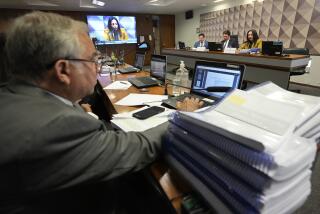A ‘battlefield of the mind’ in Iraq
The men crouched on the floor of the carpeted tent listen intently to a cleric seated on a wooden bench in front of them, some leaning forward so as not to miss a single word.
Be patient, he tells them. Follow the prophet’s example. Forgive those who wronged you. Hands shoot up, and the round-faced imam in beige slacks and sneakers begins to take their questions.
Islamic teachings have been transmitted at such gatherings for centuries. But this is no religious madrasa. The tent is surrounded by fences topped with barbed wire, soldiers stand at its entrance and the students wear the yellow overalls of detainees at U.S. facilities.
The “enlightenment” class that took place one recent morning at Camp Cropper, near Baghdad’s international airport, is part of a radical overhaul of a detention system still tainted by the abuse scandal at the Abu Ghraib prison in 2004.
“The travesty, the failure in leadership that led to Abu Ghraib can never be allowed again,” Marine Maj. Gen. Douglas Stone said in a recent interview. “The recruiting value of something like that to the extremists is so meaningful; it’s a war-fighting imperative that it never be allowed to happen.”
Since May, when he took charge of U.S. detention operations in Iraq, Stone has opened internment facilities to greater outside scrutiny and given inmates a chance to discuss their cases with military authorities.
He also has introduced a battery of programs aimed at turning suspected insurgents into model citizens. Teachers, clerics, psychologists and other specialists use the Koran to moderate inmates’ views, and provide counseling and basic education to rehabilitate the mostly poor, uneducated detainees, some of whom have been exposed to extremist indoctrination.
Stone said he aimed to overturn the conventional notion of detention as “warehousing” for insurgents and to counter the influence of militants who have used a combination of intimidation and persuasion to turn U.S. detention facilities into incubators of violence.
“It is the battlefield of the mind,” Stone said.
The task has taken on new urgency as the number of detainees held by U.S. forces in Iraq has soared to unprecedented levels. About 25,000 people are held at Camp Cropper and Camp Bucca, near Basra, the two primary U.S. facilities in Iraq. Before the security crackdown that began in February, the two centers held 15,500 detainees.
As long as they are deemed a “security threat,” adults can be held indefinitely. Many wait years before being tried or cleared, leaving them susceptible to recruitment by extremists housed with them. Iraqi law requires youths to be released within 12 months.
A U.S. military panel reviews detainee cases at least every six months. Until recently, it did so without allowing detainees to be present, and it still does not allow them to have legal representation. Now that they are allowed to discuss their cases in person, about 35% are released after first review, up from about 8% under the previous rules, Stone said.
In a bid to restore the credibility of the system, Stone has allowed representatives of the International Committee of the Red Cross, the Iraqi government and military and other agencies to visit Cropper and Bucca.
A Red Cross spokeswoman said that the agency made regular visits to the two camps, but that it had not been allowed to see facilities where detainees are interrogated before they are referred to Cropper or Bucca. It is the organization’s policy not to share its observations about detention conditions with the news media.
The U.N. Assistance Mission for Iraq noted in a recent report that it had not been granted access to any U.S. detention facilities. A Times reporter observed classes at Cropper and at a nearby education facility for juvenile detainees but was not permitted to speak with the inmates.
The idea of “turning” detainees has been a tenet of prison reform for decades. During the Vietnam War, the South Vietnamese persuaded more than 100,000 Viet Cong fighters to defect by offering them amnesty, cash, job training and homes, according to studies by Rand Corp., an independent think tank in Santa Monica.
More recently, Saudi Arabia has been using teams of experts to engage prisoners in intense religious discussions that mirror indoctrination by extremists. Officials also offer graduates help finding a job, and in some cases, a wife. Similar efforts have been made in Yemen and Singapore. But until recently, there had been no comparable effort in Iraq. Bruce Hoffman, who served as a counter-terrorism advisor for the U.S. occupation authority in 2004, said this omission had been a “monumental failing.”
“Historically, in other conflicts, this has proven a critical means of gaining strategic intelligence about the terrorists or insurgents and their organization, their motivation, their mind-set, how they are recruited . . . how organizational command and control is exercised,” said Hoffman, a professor at Georgetown University in Washington.
Other analysts say there isn’t enough data to gauge the effectiveness of such programs and that it is unrealistic to expect to convert the most hardened extremists.
“You are going to get at least some margin of people who are recidivist, people who conceal their true beliefs simply because they want to get out of the camp,” said Anthony Cordesman, a former Defense Department official and a military expert at the Center for Strategic and International Studies in Washington.
Stone said that none of the more than 1,000 detainees who had been through his programs had been arrested again. But he acknowledged that it was too soon to tell whether that would remain the case. He estimated that 30% of the detainees may be impervious to the efforts of the $254-million rehabilitation program.
His goal is to isolate these men while he goes after those who can be persuaded. Most, he said, are poor, unemployed Sunni Arabs, with little education, easily tempted by the $100 or $200 insurgents offer them to plant a bomb.
Stone believes the military’s best weapon in the rehabilitation effort is the Koran, which contains numerous prohibitions against killing.
“I think it would be a surprise to most Americans to find out . . . the detainees themselves do not seem to have deep understanding of the Koran,” Stone said. “They are more or less following what their local mosque imam is telling them to do.”
The imam who led the recent “enlightenment” class said many of his students were shocked when he showed them passages forbidding the killing of the innocent, even if they are not Muslims.
“If [a detainee] killed someone before now, after the program he will think 1,000 times before killing again,” he said. “But it will depend on where he is released, because the conditions are very difficult outside. There is too much violence.”
The imam said he knew that violence well: He was forced to move his family out of Baghdad after his mosque was destroyed by Shiite Muslim militiamen. He lives at a military base, because his work for the Americans could get him killed by extremists on either side of the sectarian conflict. Like other Iraqis interviewed, he asked that his name not be published.
In addition to attending the religious discussions, more than 7,000 detainees are also enrolled in Arabic, math, science, geography, English and civics lessons through the eighth-grade level. Stone hopes a basic education will give them the tools to read and understand the Muslim holy book for themselves.
At the new education facility for juvenile inmates, detainees cleared the ground for four soccer pitches. There are plans to build a brick factory and a textile plant that will manufacture the uniforms they wear.
Before they are released, detainees go before an Iraqi judge to swear an oath on the Koran renouncing violence, sometimes with a family member present to act as a legal guarantor.
Sunni Arab politicians, who have been among the most critical of detention operations, praise the new programs. But some recently released detainees were skeptical. They said most inmates were more likely to listen to a fellow detainee than a cleric brought in by the Americans.
“The extremists have much more effective ways of converting prisoners,” said one man, who spent five months at Bucca.
--
Times staff writer Saif Rasheed contributed to this report.
More to Read
Start your day right
Sign up for Essential California for news, features and recommendations from the L.A. Times and beyond in your inbox six days a week.
You may occasionally receive promotional content from the Los Angeles Times.






